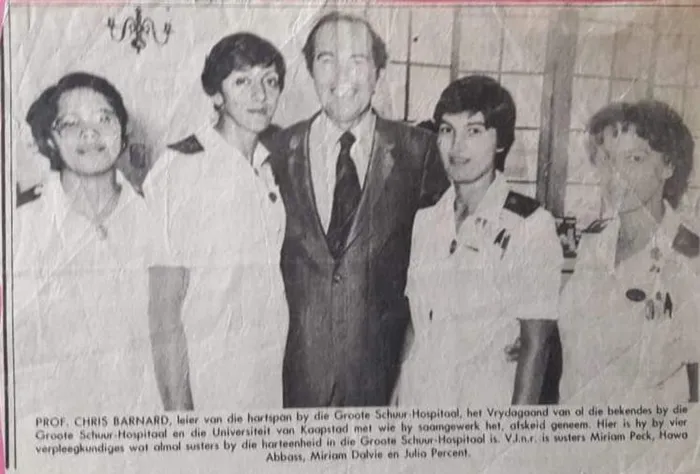Veteran nurse shares anecdotes of working in the era of the first heart transplants and Cape massacres

A newspaper clipping showing Sister Hawa Abbas (second from left) with Professor Christiaan Barnard at Groote Schuur Hospital. Picture: Supplied
On the 55th anniversary of the world’s first heart transplant performed by Professor Christiaan Barnard, a veteran nurse who has 49 years of experience under her belt has shared her memories of working alongside him in the cardiac ICU and seeing to victims of the St James Church massacre and Khayelitsha Stadium shooting.
Sister Hawa Abbas, 71, recalls the early years of pioneering heart transplants that created a world first for Cape Town’s Groote Schuur Hospital.

On December 3, it was the 55 anniversary of the transplant and Sister Abbas said she could still recall Professor Barnard’s exceptional personality and respect for his staff, regardless of their colour of skin during the 1960s and 1970s at the height of apartheid.
“Professor Barnard was always neutral in his approach, there was no colour-coding despite it being apartheid.
“I was part of the team who were assigned to look after Dorothy Fisher who had the transplant in 1969, she used to call Professor ‘Pappie’,” Abbas recalls.
Fisher was the first woman to receive a new heart in 1969 and became the longest surviving patient and lived for 12 years after her surgery and was the fifth heart transplant recipient.
It was on December 3, 1967 that Professor Barnard carried out the first heart transplant on 54-year-old Louis Washkansky by using the heart of accident victim Denise Darvall. Washkansky died 18 days after the operation from contracting pneumonia.
Sister Abbas has a rich history in nursing after delving into midwifery, trauma science, psychiatry, nursing management, and was one of the first women paramedics and even worked at GF Jooste Hospital.
She said Professor Barnard had contributed to her career by recognising the hard work they delivered and making them into better nurses.
“We had to work where they put him, we had to master it and it made us better nurses, you had to stand on your own feet,” she said.
She added she was never afraid of a challenge and recalled the St James Massacre and some of the worst crimes in Cape Town which brought patients to her ward.
“I was one of the first women to join the ambulance and I used to be a standby paramedic on the rugby field and I loved it,” she recalled.
There were occasions that stood out for her, such as the St James church massacre shooting that was carried out by four gunmen which left 11 people dead and 58 injured in July 1993.
“I was seeing patients of the St James massacre and the Khayelitsha Stadium shooting,” she said.
She added hard work and determination could place anyone on the map.
For 18 years Abbas had worked in Saudi Arabia between 2001 and 2018 as a nursing supervisor until the day of her retirement.
“I took the opportunity and went to Saudi Arabia and worked at the hospitals there as a nursing supervisor.
“I struggled at first with the languages but I learnt to adapt and eventually I learnt the language. You need to set goals in life and own them,” she said.
Today she still performs her nurse duties by giving back to her community, transporting cancer patients to hospital who are receiving chemotherapy.
Alaric Jacobs, communications officer for Groote Schuur hospital said despite there being no celebrations this year to commemorate the anniversary of the transplant, Sister Abbas’ anecdotes were fitting.
Related Topics: